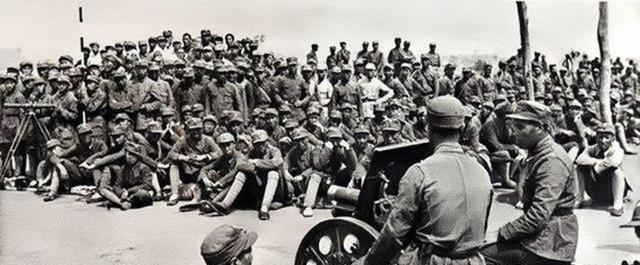In August 1940, in order to break through and smash the Japanese army's suddenly launched cage policy and the iron wall encirclement sweep, Peng Dehuai, deputy commander-in-chief of the Eighth Route Army, issued a combat order at the right time, gathered 105 regiments to launch the Hundred Regiments War, and carried out a surprise attack on the Japanese army's transportation network and the strongholds deep into our base area through guerrilla movement operations.

The great victory in the Hundred Regiments War not only further dealt a blow to the indomitable arrogance of the Japanese army, but also strengthened the determination of our army and people to resist the war, and laid a solid foundation for the counter-offensive tug-of-war operation in which the War of Resistance Against Japan shifted from the rapid movement operation in the early stage to the strategic position and for our army to win the final victory in the War of Resistance.
Originally, the Hundred Regiments War was a great victory to boost morale, and after the war, the whole country reported that the anti-Japanese armed organs in various places sent congratulatory telegrams to our Eighth Route Army, but why did it arouse Chairman Mao's concern? And told Peng Dehuai that the timing of launching the Hundred Regiments War now is not right?
In fact, from a military point of view, the Purpose of the Hundred Regiments War as a counterattack against the Japanese army's retaliatory large-scale encirclement and sweeping was successfully completed, the Eighth Route Army in the War of Resistance Against Japan began 3 years later, the anti-Japanese revolutionary base areas continue to increase, many local peasant armed forces are gradually transformed into regular armies and guerrillas, in the experience of blood and fire, the military strength is gradually completing the transformation.
In this Hundred Regiments War, our army broke through the Zhengtai Railway, and launched a multi-point flowering offensive on the Beining, Jinpu, Deshi, Cangshi, and Pinghan lines around niangziguan and Pingding sections, beating the Japanese army, which was called invincible, to the point of falling, so that the Japanese army began to face up to the strength of our army again.
However, Chairman Mao, as the supreme leader of our party and our army, was good at considering problems from the perspective of the overall strategic situation, and although after the Double 12 Xi'an Military Advice Incident in 1936, the Kuomintang and the Communists put aside their prejudices and reached a second in-depth cooperation between the whole people in resisting Japan.
From the five encirclement and suppression, no.3 and 6-way siege battles frequently launched by the reactionary government of the enemy army during the Red Army period, it is not difficult to see that Chiang Kai-shek has always been jealous of our army, and although the cooperation in the War of Resistance Against Japan was forced to be helpless, it may not have the idea of treating our army as a vanguard and a death squad, and wanted to completely annihilate our army by the hand of the Japanese army to achieve the Goal of the Nanjing Government's monopoly in China.
However, I did not expect that the Battle of the Hundred Regiments would crush the Japanese army in one fell swoop, but it exposed most of the strength of our army, and the battle was unfavorable in the later stages, and Chiang Kai-shek woke up like a dream, and began to purposefully command Tang Enbo and Gu Zhu and others, launched a surprise attack on the weak base area of our army in the North China Theater, and quickly launched a battle to suppress the New Fourth Army after briefly containing the Eighth Route Army in Jiangbei.
In early January 1941, Ye Ting, commander of the New Fourth Army, and Xiang Ying, political commissar, were ordered to lead their troops to the north of the Yangtze River, and when the 9,000-strong unit directly under the headquarters of the army was passing through Maolin in southern Anhui Province, it was suddenly surrounded and suppressed by about 80,000 people from 7 divisions of the enemy army.
After the end of this battle that shocked both home and abroad, Zhou Enlai personally rushed to Chongqing, made a reasoned attack and sternly opposed Chiang Kai-shek's stubborn idea of ignoring the great national righteousness and in the same room during the crucial period, and personally wrote down eight big characters in the Xinhua Daily with a special pen: Thousands of Ancient Injustices, One Leaf in Jiangnan, paying tribute to and mourning for the martyrs of the dead country in Jiangnan, and the words were full of sadness and anger.
However, our Eighth Route Army killed the enemy in the Hundred Regiments War, exposing all its strength and also consuming a large number of our army's troops, so that Chiang Kai-shek saw an opportunity to take advantage of it, so Chairman Mao had the foresight to express his worries: "The timing of the Hundred Regiments War is not right. ”
However, although the Hundred Regiments War was slightly inconsistent with our army's short-term strategy and tactics, it played a crucial and positive role in the long-term overall situation of the national war of resistance, not only allowing our army's combat strength to continue to complete the transformation in the experience of blood and fire, but also greatly increasing the determination and confidence of our military and people in resisting the war to the greatest extent.
The Battle of the Hundred Regiments was the greatest contribution made by our army in the early stage of the War of Resistance Against Japan, and all the people of our country understood that as long as the whole country unites as one, goes to the national difficulties together, fights the difficulties of the times, and has the determination to win, we will certainly be able to win the final victory in the War of Resistance Against Japan.